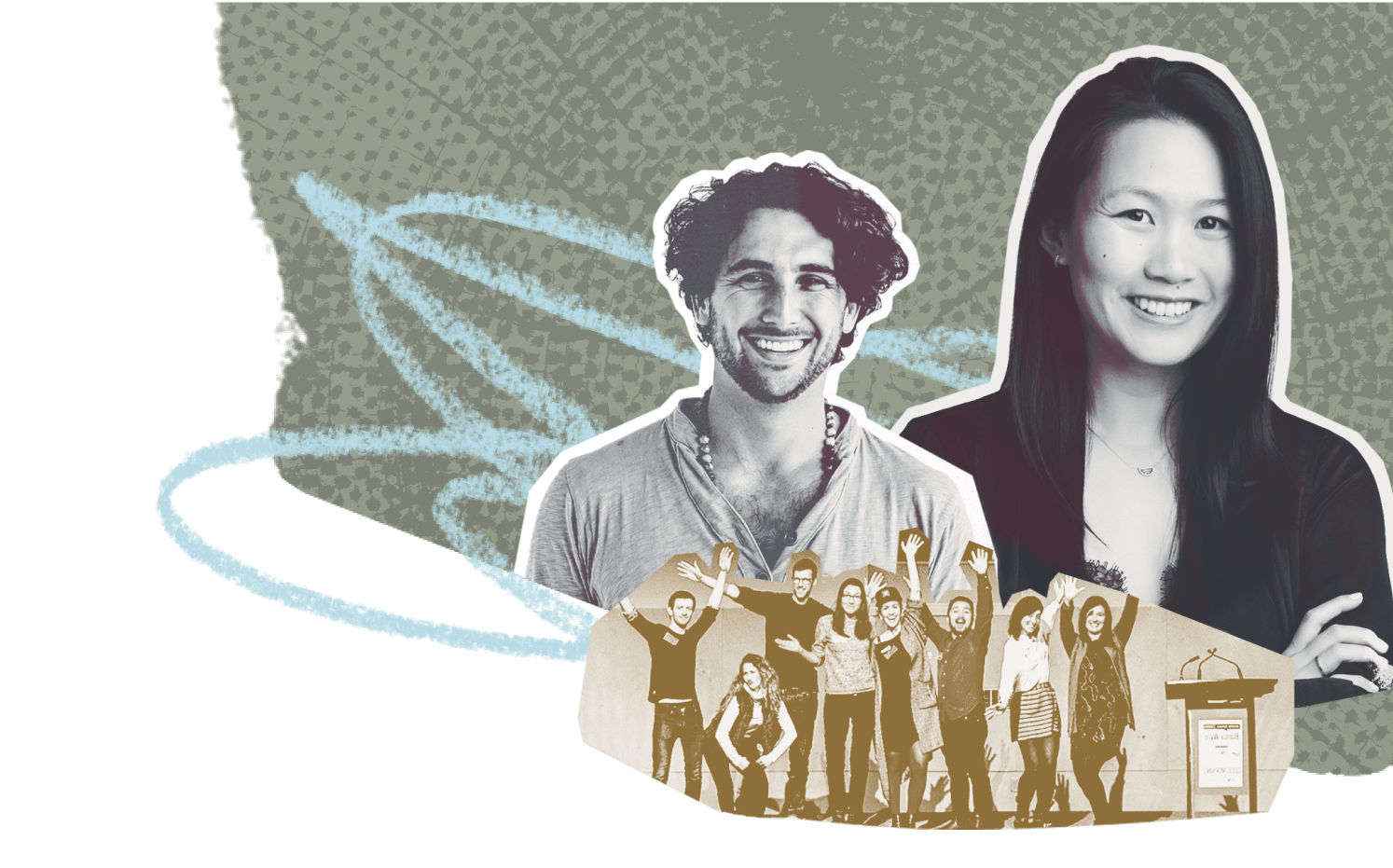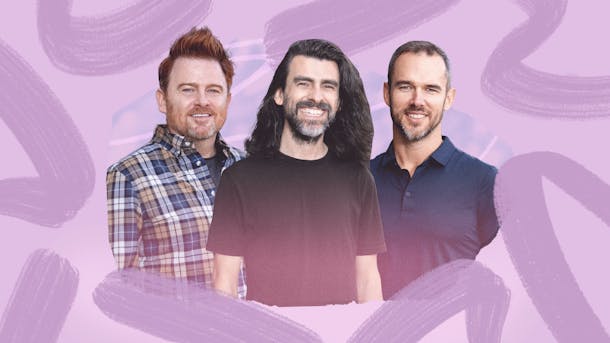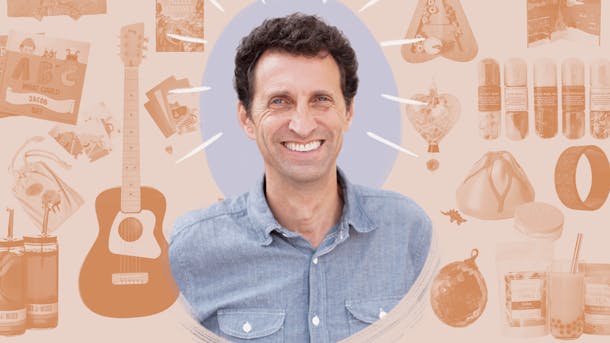
Feature Story
Education for All: Building Branching Minds
Former classroom teacher Maya Gat went from not knowing what a startup was to co-founding a life-changing EdTech platform.
Maya Gat took the initial steps to found an EdTech company while on parental leave from her teaching job.
“With no belief that it would actually go anywhere, I wrote my submission for a grant from a business incubator at four in the morning, while nursing my kid, using my one free hand to answer their questions with my smartphone,” she said.
The application did, in fact, go somewhere: Maya won the no-strings-attached prize of $20,000 — half the yearly salary she was earning as a classroom teacher at the time — for her idea to develop Branching Minds, a software platform that helps classroom teachers identify, understand, and find resources to support students with learning differences.
With that prize, Maya began building the company she later launched with co-founder David Magier in 2013. And her early morning, one-handed application process offers a glimpse into the passion and activist spirit that has fueled the founder from day one: Maya wasn’t ready to wait for morning or for two free hands. She had seen the pain of students’ struggles and the long-term, negative impact of an inequitable system that didn’t support their needs. She had felt firsthand the helplessness of teachers who didn’t have the resources they needed to support these students. It was time to act.
Ten years down the road, Maya’s commitment to taking action for teachers and students is felt in classrooms across the U.S., where Branching Minds serves over 1.5 million students. The self-described “teacherpreneur” and her equally committed co-founder continue to use the platform and company they’ve built to create better solutions for educators and better learning outcomes for students.
But the path to get here was winding, unconventional — and inspiring.
Tornadoes, tutoring, and the truest thing
Maya’s favorite game as a kid was one she invented herself called “Tornado.” The rules were straightforward: First, take your beautifully-styled dollhouse in both hands; then, shake it up. The result: Total disarray. Furniture and home goods thrown every which way; nothing in its place; essential items totally lost to the storm.
For Maya, this is where the fun started, because it wasn’t so much the disarray that interested her — it was the possibility in putting it back together. “The game was about how to innovate and persevere,” Maya explained to In the Works, just two minutes into our interview. “I've always loved that idea of being able to forge something new out of the rubble; to take what’s available, what’s around us, and make something better out of it.”
That drive to dig in and improve a situation — to create solutions — showed up throughout Maya’s childhood and young adulthood. Her love for building and creating was paired with an early dream of being a teacher. Asked what she wanted to be when she grew up, her answer reflected both of her passions: “A teacher and an inventor.”
When she wasn’t rearranging the disarray of the dollhouse, she was carefully stockpiling her school assignments and storing away reading lessons for a future career in the classroom. “My mom had to stage an intervention at one point and convince me that I wouldn’t forget how I learned to read by the time I got to teach it,” Maya said, laughing.
At 15, Maya's interest in teaching and inventing came together when she was asked to develop a tutoring program for kids facing neglect and abuse. She recruited teenagers from all over New York City to spend their Saturday mornings tutoring with her.
As tutors and mentors, Maya and the other volunteers helped students in the program — many the same age as the volunteers — with math, writing, and other assignments. “The homework felt insurmountable to many of these kids because of all of the other challenges they were dealing with,” she said.
Already aware of her own privilege, the experience of leading that effort opened Maya’s eyes even wider to the inequity in education. Tutoring also further clarified something else: Teaching was where she found her bliss.
“Tutoring was the highlight of my week every single week,” she said. “From then on, there was never a point in which I wavered about my path on this earth. The joy I experienced when I was teaching was the truest thing for me.”
But it wasn’t just teaching facts and figures that filled her up, she realized. “My love for teaching was always about empowering children. That’s always what it meant for me: Education as activism.”
A winding path: Traveler to teacher to founder
Maya’s early passion for teaching didn’t wane, but it also didn’t lead her on a direct path to the classroom. After graduating from high school and earning a BA in Urban Studies, she decided that the first step in becoming the teacher she wanted to be wouldn’t be to jump into the classroom — but to hit the road.
“If my job as an educator was to be a facilitator of learning, of understanding and unlocking kids’ potential to explore different paths, I knew I needed to explore more of the world myself,” Maya said. “Instead of becoming a teacher, I initially became a collector of life experiences.”
Her exploration took her across the urban and rural U.S. and abroad for several years after college, where she took on jobs as a cook, waitress, barista, bookkeeping assistant, bartender, and supermarket shelf stocker, among other posts. She learned the trade-offs of different paths, what it’s like to live on different salaries (including minimum wage), and the different opportunities that open up or are barred depending on where you live, your education level, and how much you earn.

I was always hyper aware of inequities and how education could unlock potential that could allow people to transform their lives, their outcomes, and their communities.
Wherever she was living, Maya always made sure to keep one foot in teaching. “While I was working in San Francisco as a bookkeeping assistant, I was teaching day laborers English on the side,” she said. “While I was living in Gainesville, Florida, working in a supermarket, I was substitute teaching in an alternative school.”
With several years of first-hand experience and real-life education behind her, Maya then headed to graduate school and earned a Master’s degree in Early Childhood and Childhood Education and Teaching. After graduating, she accepted a full-time role as a teacher at an elementary school in the Bronx. She was finally headed to the classroom.
Love was necessary but not sufficient: Solving systemic challenges
Once in front of her students, Maya realized pretty quickly that all of her intentional work to get there — academic prep and life experience — hadn’t actually equipped her to offer what many of her students needed. “I had the heart and soul of an educator, but I didn’t have the insights and guidance that I needed to be an effective one,” she said. “Love was necessary but not sufficient to tackle the work.”
Specifically, Maya found herself struggling to support students with learning challenges whose needs weren’t being met by the curriculum and existing resources the school system offered. She didn’t have tools to help her assess and track students’ learning, and she lacked the research and resources to make data-driven decisions about how to best intervene. There were no good solutions to collaborate with other teachers around students’ needs, either.
Instead, she was patching together information from various narrow assessment tools that the school had selected and desperately seeking more resources that would help her understand and respond to the results of those assessments. Kids weren’t getting the help they needed and outcomes weren’t improving.
“I regularly felt that I didn’t have control over the system in which I was working,” she said. “I felt like I was burning the candle at both ends and throwing spaghetti at the wall, trying to figure out what I could do to help these kids improve their reading, their mathematical performance, and their confidence.”
Around the same time — in the beginning of the 2010s — as she was struggling to find solutions, Maya noticed the way companies like Amazon and Netflix were using data to cater to consumer interests. She also became intrigued by the WebMD symptom checker tool, which helped people navigate their medical symptoms.
Against this backdrop, it didn’t take long for her inventor’s brain and educator’s perspective to spark an ah-ha moment: “If technology could track my behavior to recommend what shoes I should buy and help me navigate medical diagnostics, why couldn’t we use something similar to track our students’ learning paths and needs?” she wondered. “Why isn’t this being used in education?”
The more she thought about how much teachers would benefit from a centralized platform for tracking, assessment, and research, the more obvious the solution seemed. But she was stalled by her own imposter syndrome. “I just kept thinking to myself, ‘What do I know? I’m just a classroom teacher. I'm not a tech entrepreneur. I'm not an engineer.’”
I stepped into teaching with so much enthusiasm and excitement. I had such a desire to effect change. But I soon realized that while I had the heart and soul of an educator, I didn't have the insights and guidance to be effective.
The problem and the opportunity were on Maya’s mind as she left the classroom for parental leave ahead of the birth of her first child. Also on her mind: activism. She had developed a curriculum for her elementary school students to empower kids to identify problems in their communities and dream up solutions to resolve those issues, and she couldn’t ignore her own call to action. “The hypocrisy smacked me in the face. I knew I couldn’t tell a seven-year-old he has what it takes to go and solve problems and then not act on the idea I’ve been sitting on because ‘I’m just a teacher.’”
At home, awaiting the birth of her baby and — as she described it — “supercharged by nesting hormones (which, by the way, somebody should really bottle),” Maya got to work prepping for more than motherhood. As she cleaned out closets and prepped a nursery, she was also thinking through elements of a software platform that would solve her challenges in the classroom.
The prep, for a baby and for a business, paid off. Fast forward several months and Maya, with her healthy newborn in her arms, was filling out that business incubator grant application — one-handed, on her smartphone, in the wee hours. Branching Minds was officially in the works.
A startup founder who asked “What’s a startup?”
Buoyed by the grant, Maya kept her idea moving forward during the remainder of her parental leave. She reached out to all the people in her life who knew anything about technology and building a business, and she asked a lot of questions.
Technologically, the idea was absolutely feasible, but a good friend in the tech space told her if she wanted it to happen quickly, she’d need to launch as a startup — to which Maya responded, “What's a startup?” At that point, her next step became clear: Find a co-founder with startup and tech expertise.
Her search for a partner began and ended with a single entry in the LinkedIn search bar. “I literally typed in ‘startup’ and David’s name came up,” Maya said. Turns out the David in her search results was co-founder David Magier, whose profile revealed quite a few shared high school and college connections, and who had experience as a corporate attorney and an advisor to tech startups.
David was immediately drawn to Maya’s vision. “I had a sense at the time that while technology was an extremely powerful tool, it generally wasn’t being used to make the world a better place,” he said. “EdTech was a place where it would be possible to use technology to improve communities and have a meaningful impact.”
The prospect of partnering with Maya, specifically, inspired David, too. “She had such a clear understanding — and such rich personal experience — of the real-world pain point that she was trying to solve for educators,” he said. “And, as a community organizer and activism teacher, she had experience inspiring passion and getting humans at scale to change their behavior, as well as rally around a cause.” David was on board.

When we first met, Maya had a strong vision and a wealth of education experience. I had strong experience founding and operating tech startups. It was clear that I could provide a lot of value and that we would be a great team.
Building a business model that meets the mission
With a shared vision and a long list of to-dos to get the company off the ground, the next several years saw David and Maya pushing equally hard in all directions to launch and fund the business. David refers to this period as the “Swiss Army knife era,” when they were each taking on anything and everything that needed doing.
They dug into validating the problem they were aiming to solve, conducted hundreds of interviews with educators and administrators, and identified funding sources. They had early success winning a business plan competition, and they were accepted into two accelerator programs, including Techstars.
It was their Techstars experience that nudged the co-founders to double down on keeping values at the center of Branching Minds. Advisors at the accelerator recommended a B2C model — selling the product directly to parents and teachers — because selling to school districts was so challenging. But Maya knew that the students she had worked with in the Bronx wouldn’t have benefited from a B2C model, and neither would so many others.
“If we went that route, Branching Minds would’ve only supported folks who had the extra income to afford an app or access a paid service,” she said. “We knew we had to stick to B2B and just figure out how to work with schools from that point forward. That’s how we would meet our mission.”
Meeting that mission also led David and Maya to found Branching Minds as a B Corp. “For us, choosing to become a B Corp was a no-brainer,” David said. “We started Branching Minds as a way to make education more accessible, equitable, and effective — and we are driven by our desire to have a positive impact on society.”
The co-founders saw that the governance structure of a B Corp would empower them to continue focusing on creating value for all their stakeholders, including staff, customers, and the broader education community.
With their values intact, David and Maya kept moving, raising enough funding in 2014 to hire a full-time engineer who could build out and then iterate on the Branching Minds MVP. From there, the focus moved to honing their sales approach — which they knew was going to be key. Not only were they selling to school districts, which is notoriously challenging, but they were selling a totally new tool.
“We developed a solution that the market had not yet realized was needed, so that meant that early sales conversations had to be focused on educating customers about the need that our solution addressed, before we could focus on the solution itself,” David explained.
With gradual refinement, they earned more and more customers. As they gained traction, they were able to scale by hiring additional team members across sales, engineering, and data science. But it definitely didn’t happen overnight. “Our Swiss Army knife phase really continued until 2020,�” David said.

Doing good feels good: Scaling to support more schools
Today, the co-founders can happily confirm they’ve moved beyond the Swiss Army knife era. With almost 90 employees, David and Maya have been able to scale their operations with the talented team they’ve assembled.
And they can do so as proud founders of a company that has accomplished its goal and remained aligned with its values. Branching Minds directly solves the pain point Maya originally set out to tackle: The MTSS (multi-tiered system of support) platform uses tech, data, and learning sciences to identify a student’s strengths and challenges across academic, cognitive, social-emotional, and behavioral skills. Then it provides K-12 educators with personalized, evidence-based interventions to meet the student’s needs, driving better learning outcomes.
Branching Minds also provides school districts support in the form of coaching, workshops, and other learning opportunities to help educators understand and respond to learning challenges. They’re collaborative and invested partners, working alongside school districts to make good on their mission. And educators are increasingly aware of the value of their work: Branching Minds is currently used in school districts across 33 states in the U.S.
For some school districts, the impact of Branching Minds goes beyond education. “Last year, we released new wellness-related functionality to one school district, and they told us the ability to see and track wellness data and then take the right, appropriate action to respond to students’ situations is actually going to help them save lives,” Maya said proudly. “That feels good.”
Values remain at the core
As proud as they both are of the company’s growth, David and Maya are most proud of their ability to scale their values at the same time. “I have a real hard time with hypocrisy and bullshit,” Maya told us. “I’ve always tried to walk the talk. Values have always been at the core of what we do; I’ve never been willing to compromise.”
This commitment has often meant prioritizing purpose ahead of profit: “There have been thousands of times when there’s been a choice of ‘Do we go this way because it’s easier or more profitable?’ or ‘Do we go that way because it aligns with our values?’” Maya said, “but we always stay really, really true to our values.”
“As a purpose-driven company, we have always focused on creating value for our stakeholders — including customers, employees, investors, and the education community broadly,” David added. “For us this has meant continually ensuring that our values of empathy, joy, collaboration, growth, and equity are baked into our operational and financial practices.”
The co-founders’ unwillingness to compromise in the areas of equity and integrity is felt in the culture they’ve shaped. “I think it has created an environment where people feel extremely motivated to do their best work and are fully supported when the work is really hard — which it often is,” Maya said.

Both Maya and David understand that maintaining that supportive culture means personally leading with integrity. “Internally, Maya and I take a servant-leadership approach,” explained David. “We see our role as being in service of supporting our remarkable team to do their best work. It’s been so gratifying to support and develop folks and to see their growth alongside our company’s growth.”
And it’s clear that Branching Minds’ employees appreciate a truly values-led environment. As Maya confirmed, “We have incredibly high retention numbers and incredibly high engagement and inclusion scores. People feel very, very grateful to be part of this — just as I do.”
Green lights and gratitude pave the way for Branching Minds’ future
Maya Gat’s childhood dreams came true: She became a teacher and an inventor. “In retrospect,” Maya said, “doubting that I could create a solution and build a company because ‘I’m just a teacher’ seems pretty ridiculous.”
It turns out, the core competencies she has as a founder and leader are many of the same things she excelled at as a teacher: “The powers of persuasion and articulation; the ability to envision and help people see what's on the other side of this hard effort that they're about to put forth; the power of backward design — of understanding the goal and then planning strategically to get there from here — which mirrors curriculum planning. All of those competencies have translated to my role as a founder,” she said.
And it’s not just Maya’s dreams being fulfilled. For David, the opportunity to build a technology company that does good — a rare find in the startup landscape when he partnered with Maya over ten years ago — has been incredibly gratifying. “As a parent, it has been such an honor to be part of creating a business that has had such a positive impact on education,” he said. “It is rewarding to be able to bring my skills and background to something that matters so much.”
As they continue to receive empowering feedback from teachers and students about the impact of their work, the co-founders are inspired to keep building. To quote one of Maya’s mantras, “If the universe gives you a green light, keep on driving.”
So where do Maya and David hope the road takes them and the company they’ve built?
“Our goals looking forward are simple,” David said. “To continue focusing on our mission above all else; innovating and expanding into new areas; growing as a company; and maintaining and nurturing the wonderful culture we’ve created together, which has led to our success and made Branching Minds an amazing place to work.”
Curious to learn what In the Works is all about?
Go behind the scenes



